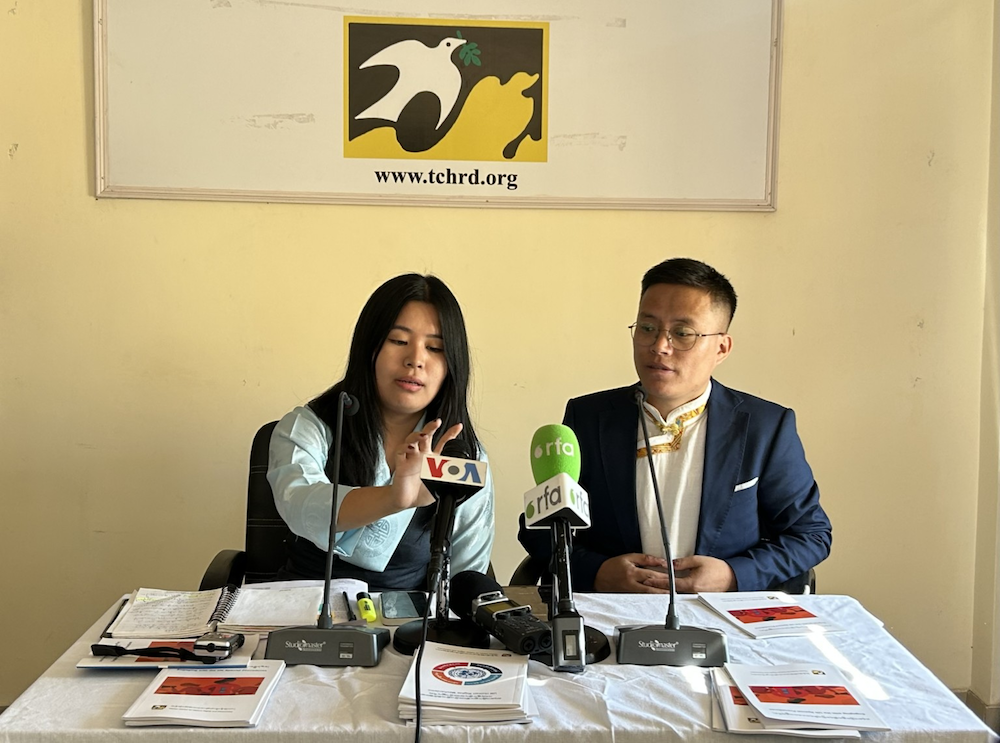By Tenzin Dedan
DHARAMSHALA, Oct 26: To celebrate the 78th anniversary of the United Nations (UN), the Tibetan Centre for Human Rights and Democracy (TCHRD) on Tuesday unveiled a Tibetan guidebook, “Engaging with the Special Procedures.” This guidebook is a significant resource, shedding light on one of the most critical human rights mechanisms within the UN system.
Nyiwoe, a researcher at TCHRD pointed out that “most avenues involving human rights issues within the UN are inaccessible to us due to various reasons, such as our statelessness, non-membership in the UN, China’s significant influence, and the absence of powerful organizations.” He stressed that “the UN Special Procedure remains open and accessible to all individuals and organizations.” Therefore, the release of this essential booklet by TCHRD aims to encourage the Central Tibetan Administration, non-governmental organizations, and individual Tibetans to use the guidebook to address the challenges faced by Tibetans on the global stage, such as at the UN.
Recognizing China’s substantial influence and power within and outside the UN, where China often obstructs or diverts discussions, Nyiwoe asserted that “the fact that Tibetan issues have been discussed at the UN multiple times is a success.” He cautioned that the diminishing focus on Tibet on the international stage could create a false impression that there are no persecutions, similar to those in East Turkestan, happening in Tibet, which is not the case. Initiating discussions about persecution and injustice in Tibet, East Turkestan, and even China on international platforms like the UN is a form of “challenging” China, which invests significant resources in portraying a positive, virtuous image of itself worldwide.
Phurbu Dolma, a legal associate at TCHRD mentioned, “In the past eighteen months, we have submitted 21 urgent appeals to the UN through UN Special Procedures.” She highlighted that three recent submissions in October include cases like Tsultrim, who was arrested in February for possessing a photo of the Dalai Lama, Tsepo, and Wangchen, a former political prisoner currently receiving treatment for injuries sustained under Chinese authority.
She also noted that Geshe Rachung Gendhun and Geshe Sonam Gyatso are part of the 21 urgent appeals submitted to the UN. Notably, Geshe Sonam Gyatso was released from prison on May 23, although his health remains a concern. TCHRD continues to advocate for the release of Geshe Rachung Gendhun.
On August 10 this year, three UN experts issued a joint statement condemning China’s lack of transparency in the arrest, trial, and imprisonment of nine Tibetan environmental activists. They called on China to “cease persecuting environmental human rights defenders and release all nine immediately.” In February, UN experts expressed serious concerns regarding China’s policies aimed at culturally, religiously, and linguistically assimilating Tibetan people through a residential school system, affecting approximately one million Tibetan children.
The UN Special Procedure serves as the “eyes and ears” of the UN Human Rights Council, consisting of independent human rights experts and working groups. These mechanisms address a wide range of human rights issues, spanning civil, cultural, economic, political, and social rights.
The Special Procedures are an integral component of the United Nations Human Rights Council (UNHRC) framework, comprising a crucial cadre of independent human rights experts and working groups. These mechanisms collectively address a wide range of thematic human rights issues, encompassing civil, cultural, economic, political, and social rights.











2 Responses
Excellent news !
UN whose one of the veto power members is the Communist China. How could we trust on this organization? Please stop using slogan such as “UN, we want justice”. I do not trust and expect anything from UN since I learn about its history. I can only trust two countries in the world, India and United States. We have blood relationship with India on our evolution and also civilization. According to history, China and Tibet have always fought and could not build genuine trust. Nepal occupied Himalayan region of Tibet during the Gorkha-Tibet war. We still could not gain those areas nor made any attempt. It is rather Tibet be part of India then living under colonial regime, China.